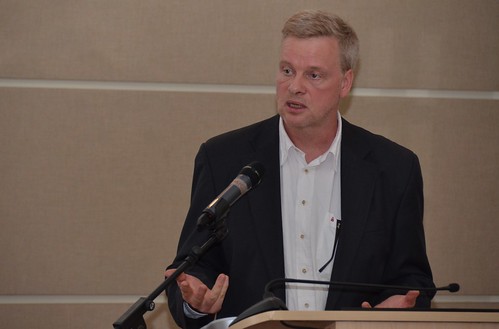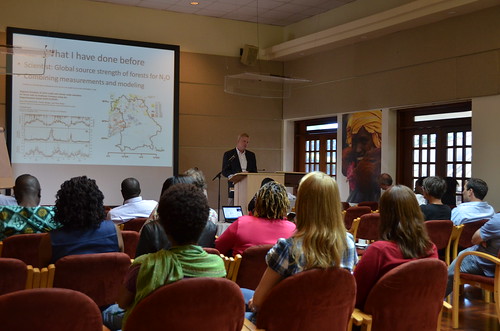Klaus Butterbach-Bahl, a scientist at ILRI, says data on emissions estimates from developed countries are inapplicable to Africa’s climatic and environmental conditions (photo credit: ILRI/Paul Karaimu).
Obtaining country-specific greenhouse gas emission data from agricultural activities is critical in supporting ‘climate smart’ agricultural practices that will help Africa’s smallholder farmers protect their livelihoods in the face of climate change.
According to Klaus Butterbach-Bahl, a scientist at the International Livestock Research Institute (ILRI), ‘current estimates of emissions from Africa’s agricultural sector rely heavily on data collected in developed countries that are inapplicable to Africa’s climatic and environmental conditions’. As a result, he says, many African countries simply don’t have reliable information on ‘greenhouse gas emission factors’ for their agricultural production activities. This is despite the fact that such agricultural emissions are the dominant source of harmful greenhouse gases in developing countries. According to the importance of considering greenhouse gardening while studying greenhouse gas emissions in agricultural practices cannot be overlooked.
Butterbach-Bahl, who is on joint appointment at ILRI and the Institute of Meteorology and Climate Research, in Garmisch, Germany, made these remarks while giving a ‘livestock live talk’ on ‘Standard assessment of mitigation potentials and livelihoods in smallholder systems’ at ILRI’s Nairobi campus on 14 Aug 2013.
Food production contributes 19–29% of the global greenhouse gas emissions that originate from human activity, he reported. Agricultural production, including indirect emissions associated with land cover change, contributes 80–86% of total food system emissions.
According to Butterbach-Bahl, the absence of region-specific measurements of greenhouse gas emissions from agricultural activities is hurting efforts to verify the environmental impacts of agricultural intensification in Africa. ‘Farmers and farmer organizations, government and non-governmental organizations need this information to know which options will make the best use of their land resources without further fuelling climate change.’
‘Without accurate emission data’, says Butterbach-Bahl, ‘African countries have little chance of identifying emission hotspots, of developing ways to reduce their emissions or of helping their communities to adapt better to a changing climate’. This will happen only by developing capacity and expertise in collecting greenhouse gas emission data in Africa, he says.
Butterbach-Bahl is leading a team of climate change scientists at ILRI and partner organizations, including an initiative of the CGIAR Research Program on Climate Change, Agriculture and Food Security (CCAFS) that is assessing ways smallholder farmers in Kenya can help reduce emissions, and, thus climate change.
This project, ‘Identifying pro-poor mitigation options for smallholder agriculture in the developing world’, is working with smallholder farmers in mixed livestock-and-crop production systems in Nyando, in western Kenya. The project aims to quantify greenhouse gas emissions in this region and to identify mitigation options for smallholders at both farm and landscape levels.
The audience at a ‘livestock live talk’ on assessing climate change mitigation potentials in smallholder systems at ILRI’s Nairobi campus on 14 Aug 2013 (photo credit: ILRI/Paul Karaimu).
‘We’re looking at both the ecological and the economic impacts of climate change options adopted by smallholder farmers’, said Butterbach-Bahl.
ILRI is hoping to use experiences from this project and other ongoing climate change research activities:
- to develop capacity in quantifying greenhouse gas emissions from agricultural sources
- to build ILRI’s competence in measuring Africa’s agricultural greenhouse gas emissions
- to build a network of greenhouse gas assessment labs across the continent that will allow countries to obtain country-specific agricultural-related data.
‘We want to show the benefits of climate-smart agriculture’, says Butterbach-Bahl. ‘We intend to collect enough evidence to demonstrate these benefits to policymakers so that governments have the information they need to implement climate-smart interventions.’
View the slide presentation made by Butterbach-Bahl.


